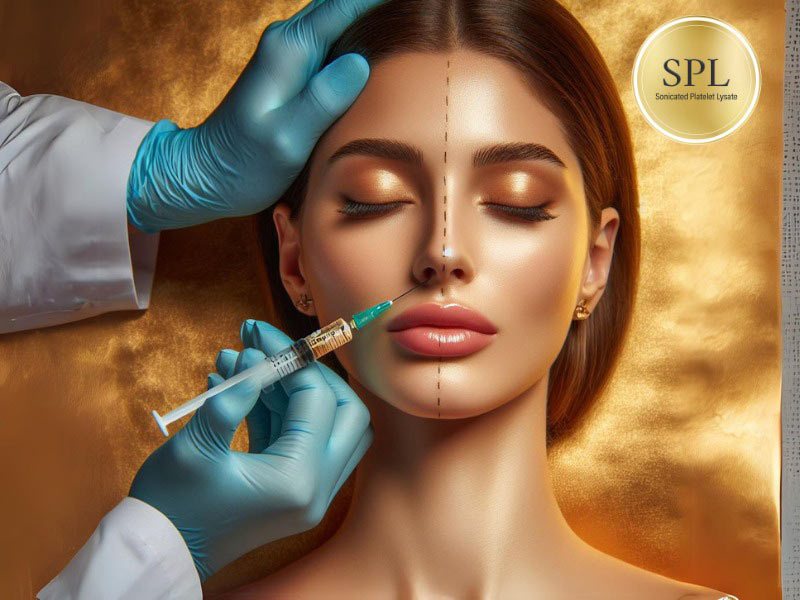Hair loss is a prevalent concern affecting millions of individuals globally, impacting both men and women. While various treatment options exist, the quest for more effective and innovative solutions continues. In recent years, Sonicated Platelet Lysate (SPL) has emerged as a promising contender in the field of trichology, offering potential advantages over established methods like Platelet-Rich Plasma (PRP). This comprehensive analysis delves into the science behind SPL, explores its potential applications in trichology, and discusses the current state of research and future directions.
Understanding the Science:
- Platelets: Beyond Blood Clotting:
Platelets, tiny cell fragments found in blood, are primarily known for their role in blood clotting. However, they also contain a rich cocktail of growth factors, signaling molecules that play a crucial role in various cellular processes, including:
- Cell proliferation: Stimulating the growth and division of existing cells, crucial for hair follicle regeneration.
- Cell differentiation: Directing cells towards specific functions, promoting the development of healthy hair follicles and hair shafts.
- Angiogenesis: Promoting the formation of new blood vessels, enhancing blood flow and nutrient supply to the scalp.
- Anti-inflammatory properties: Reducing inflammation in the scalp, which can contribute to hair loss.
- From Blood to SPL: Unlocking the Potential:
Creating SPL involves a fascinating two-step process:
- Blood Draw and Platelet Concentration: A small amount of blood is first drawn from the patient. Through a process called centrifugation, platelets are separated from other blood components like red blood cells and plasma.
- Sonication: The concentrated platelets undergo low-energy sound waves, a process known as sonication. This crucial step unlocks the potential benefits of SPL:
* Enhanced Release: Sonication gently breaks down the platelets, releasing a wider range and potentially higher concentration of growth factors compared to traditional methods like PRP.
* Standardization: Sonication ensures a consistent and standardized preparation, unlike PRP, which can vary in its platelet concentration and growth factor content.
- The Science Behind Growth Factors:
The diverse growth factors present in SPL play a critical role in various aspects of hair growth:
- Vascular Endothelial Growth Factor (VEGF): Promotes the formation of new blood vessels, enhancing blood flow and delivering essential nutrients to hair follicles.
- Insulin-like Growth Factor (IGF-1): Stimulates hair follicle proliferation and the transition from the resting (telogen) phase to the growth (anagen) phase of the hair cycle.
- Epidermal Growth Factor (EGF): Promotes the proliferation and differentiation of various cell types in the hair follicle, including hair follicle stem cells.
- Platelet-Derived Growth Factor (PDGF): Promotes cell proliferation and migration, potentially contributing to hair follicle regeneration.
Potential Applications of SPL in Trichology:
- Androgenic Alopecia (AGA):
- AGA, commonly known as male pattern baldness and female pattern hair loss, is the most common form of hair loss.
- Early studies suggest SPL may offer promising benefits for AGA by:
- Stimulating dormant hair follicles to enter the growth phase, leading to new hair growth.
- Improving scalp health by reducing inflammation and promoting blood flow.
- Supporting hair transplant procedures by enhancing graft survival and accelerating healing.
- Other Hair Loss Conditions:
- SPL’s potential extends beyond AGA and might be explored for other hair loss conditions like:
- Alopecia areata: An autoimmune condition causing hair loss in patches.
- Telogen effluvium: Temporary hair loss triggered by stress, illness, or hormonal changes.
- Cicatricial alopecia: Permanent hair loss caused by scarring of the scalp due to injury, infection, or burns.
- Scalp Health and Maintenance:
- Beyond hair loss treatment, SPL may contribute to overall scalp health by:
- Promoting blood flow and nutrient supply to the scalp.
- Reducing inflammation and creating a healthier environment for hair growth.
- Stimulating collagen production for firmer and healthier scalp tissue.
Read More: Unveiling Tranquility: A Retreat at Daksh Resort
